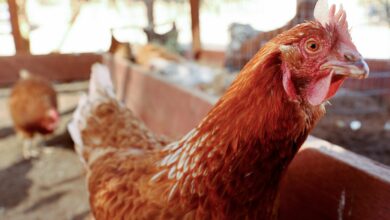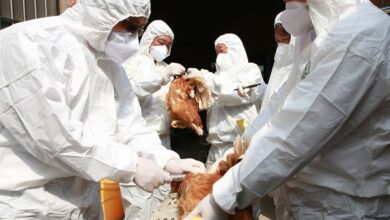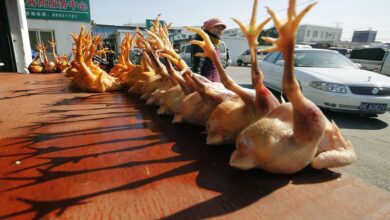
Egypt reported on Sunday two additional confirmed cases of human infection with bird flu virus A/H5N1, bringing the total number of human infections in Egypt this year to six cases.
The Egyptian Ministry of Health announced that the first case was a three-year-old child from Minya, Upper Egypt, who was exposed to dead birds at his house. According to a statement by the Health Ministry, the child is receiving treatment at Minya Fever Hospital and is in good health.
The second case was a 19-year-old woman from Assiut who culled birds at her house after some of them had died. She was transferred to Assiut University Hospital where she was placed on a ventilator. The woman suffers from double pneumonia and is in a critical condition, according to the statement.
Amr Kandil, head of the preventive medicine sector, said Sunday the bird flu has not yet left Egypt, according to news website dotmsr.
Kandil also told dotmsr that 179 people caught bird flu in Egypt since it emerged in 2006. The death rate reached 36 percent (almost 64 cases), compared to 55 percent on the international level, mostly in China.
One case died in 2014 of the A/H5N1, Kandil pointed out.
Around two million workers involved in the poultry industry and eight million people of their relatives have been harmed since the emergence of bird flu in Egypt, according to the State Information Service.
On Thursday 26 June 2014, the Ministry of Health announced that a 34-year-old man in Minya had been inflected with the A/H5N1 virus.
The WHO published a report in 2014 on the influenza A (H5) activity from 18 February to 23 September 2014. The report mentioned that the infections of the A (H5) reported to the WHO by Egypt included poultry and humans.
Another WHO report published on 2 October 2014 mentioned that 175 people had died due to infection with avian influenza, the A (H7N9) virus.
WHO advised that travelers to countries with known outbreaks of avian influenza should avoid poultry farms, or contact with animals in live bird markets, or entering areas where poultry may be slaughtered, or contact with any surfaces that appear to be contaminated with feces from poultry or other animals. Travelers should also wash their hands often with soap and water. Travelers should follow standard food safety and hygiene practices.




